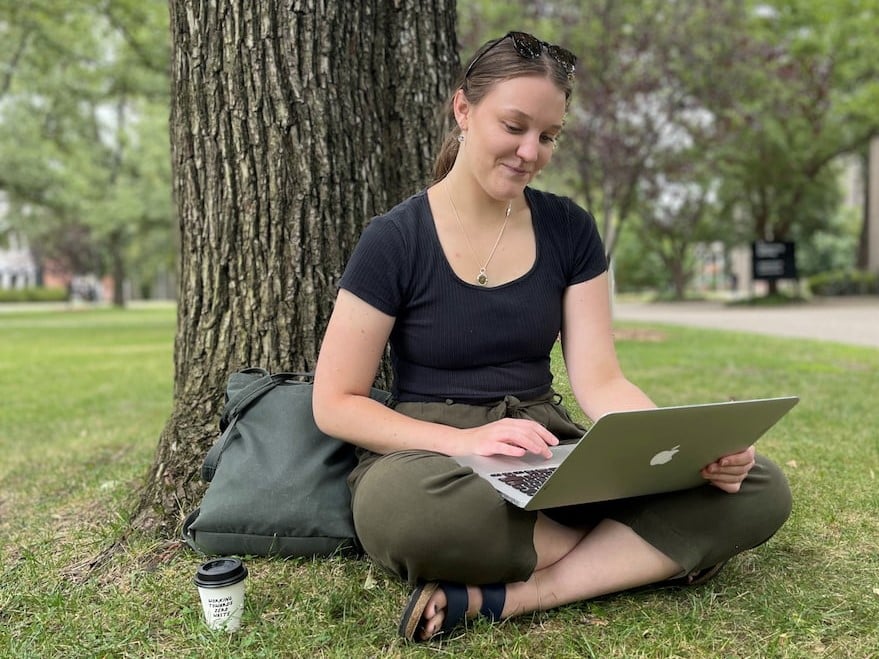After almost failing maths in high school, 18-year-old Luella Phillips is now embarking on a career in STEM, in part thanks to a tutor who supported her learning through undiagnosed ADHD.
Luella always had a love-hate relationship with school.
“I love learning about new things, I’m very curious about how the world works. But especially in my earlier high school years, I didn’t enjoy school. It was very overwhelming for me.”
The first winner of Keane Consulting’s Next Gen ICT award, the $6,000 prize will support Luella’s first year at ANU as she undertakes a Bachelor of Engineering.
The prize is awarded to young Canberrans who have overcome learning challenges in high school and college. It also includes access to mentoring and networking opportunities from Women in ICT (WIC) members, a local group that champions women in the information and communication sector.
President of WIC, Tara Searle said “we know the issues faced by women in STEM, from pay gap discrepancies to stereotyping and gender bias. We know it can be particularly difficult at university when often you are the only women in tutorials, computer labs and group projects.”
This sentiment is shared by Luella, who was nervous before starting her engineering course.
“It’s been really nice to feel like there are other women out there who have experienced similar things to me,” she said.
“Feeling like you’re not listened to in conversations, mansplaining, happens all the time and it crushes your confidence. That happened to me a lot throughout high school and college.”
Luella is part of an increasingly recognised trend of females being diagnosed with ADHD far later in life than their male counterparts.
The average age of ADHD diagnosis is seven years old. Luella was almost 16 by the time her symptoms were recognised.
The confusion and low self-esteem that came from undiagnosed ADHD discouraged Luella from STEM for most of her school years.
She might never have pursued engineering if it weren’t for an inspiring tutor who helped her overcome early learning hurdles and proved to her that “I didn’t have to change myself to also be interested in STEM”.
“I had zero confidence in school. I couldn’t achieve the things that I knew that I was capable of, and I didn’t understand why,” said Luella. “It was never that I wasn’t capable, or smart enough; I had a neurological disorder.
“The first word that comes to mind when describing my ADHD is ‘frustrating’. A lot of the things that I struggle with are things that everybody struggles with; everybody gets distracted sometimes, everybody is late occasionally.
“For me, ADHD was interrupting my ability to function. It’s very frustrating. Things that people struggle with in everyday life interrupt my ability to be a normal person.”
The Diagnostic and Statistical Manual of Mental Disorders (DSM-5) recognises three different types of ADHD: primarily hyperactive and impulsive, primarily inattentive, and combined.
“A lot of girls have the inattentive kind, whereas a lot of boys tend to have the hyperactive kind, the kind of ADHD you think of when you hear the term ‘ADHD’, the little boy running around the classroom disturbing everyone.
“But that’s not what it’s like for everybody, and especially not for girls,” said Luella.
“A lot of girls haven’t been allowed to be the loud little boy that runs around the classroom screaming. We’re not allowed to be like that by society, so, of course, our ADHD presents differently.
“It can be a very internal disability and I think people aren’t aware of that, though there’s becoming more awareness of that now.”
Today she looks forward to forging a career in an industry where women are heavily underrepresented.
“It’s hugely important to help eliminate the boundaries women may be facing when pursuing STEM,” Luella said. “In any field, you need diverse opinions and diverse perspectives, especially in a field like engineering, where we’re finding solutions to problems in the world. How can we find those solutions when the people finding them only represent half of the population?”
Get the latest Canberra news, sport, entertainment, lifestyle, competitions and more delivered straight to your inbox with the Canberra Daily Daily Newsletter. Sign up here.



